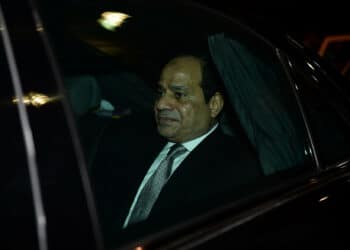Solafa Magdy Sallam, journalist and human rights activist
Update
On April 13, 2021, the Supreme State Security Prosecution ordered the release of Solafa Magdy Sallam and her husband Hossam Abdel Mohsen Mohammed, commonly known as el-Sayyad. Later that day, Sallam's mother posted a picture of the reunited family on Facebook, stating, "My children are with me." Egyptian security forces arrested Sallam on November 26, 2019 and detained her until this release.
***
Summary
Solafa Magdy Sallam is a freelance reporter and human rights activist whose work focuses on marginalized and discriminated groups in Egypt. Security forces arbitrarily arrested her on the evening of November 26, 2019. She disappeared for more than 15 hours before she appeared in front of the Supreme State Security Prosecution (SSSP) in Cairo's Fifth Settlement on November 27, 2019. She is now a defendant in SSSP Case No. 488/2019, accused of collaborating with a terrorist organization and spreading false news. As of September 2020, Sallam and her husband Hossam Abdel Mohsen Mohammed (commonly known as Hossam el-Sayyad), who is charged in the same case, are detained and separated from their seven-year-old son, Khaled.
Methodology
DAWN researchers interviewed sources close to the detainee, investigated official documents, and consulted other information from published sources that we consider to be reliable. DAWN is not disclosing the identity of the interviewees to protect their security. They are referred to as indicated below, including the dates of the interviews:
- Interview with source A, on July 16 and 20, 2020.
- Interview with source B, on July 21 and 29, 2020.
- Interview with source C, on July 10, 17 and 23, 2020.
- Interview with sources D, E and F, on July 28 and August 10, 2020.
Personal Background
Solafa Magdy Mahfouz Elsayed Sallam was born in Jordan on January 31, 1987 and works as an Egyptian freelance journalist and human rights activist. She graduated from the Faculty of Law at Ain Shams University in 2009 with a Bachelor of Law. Sallam contributed to video reports featured on Egyptian and international news platforms including Mada Masr and Deutsche Welle (DW).
In September 2019, she participated in the United Nations Reham al-Farra Memorial Journalism Fellowship, and, in 2020, she won the prestigious Courage in Journalism Award from the International Women's Media Foundation (IWMF). On April 27, 2020, the Washington Post Press Freedom Partnership spotlighted Sallam, among other journalists, who "are facing murder threats, detention and lifetime prison sentences simply for doing their jobs—reporting the truth and holding the powerful to account," as Frederick J. Ryan Jr., publisher and CEO of The Washington Post, stated.
Sallam is married to photojournalist Hossam Abdel Mohsen Mohammed, commonly known as Hossam el-Sayyad. The two have a seven-year-old son, Khaled.
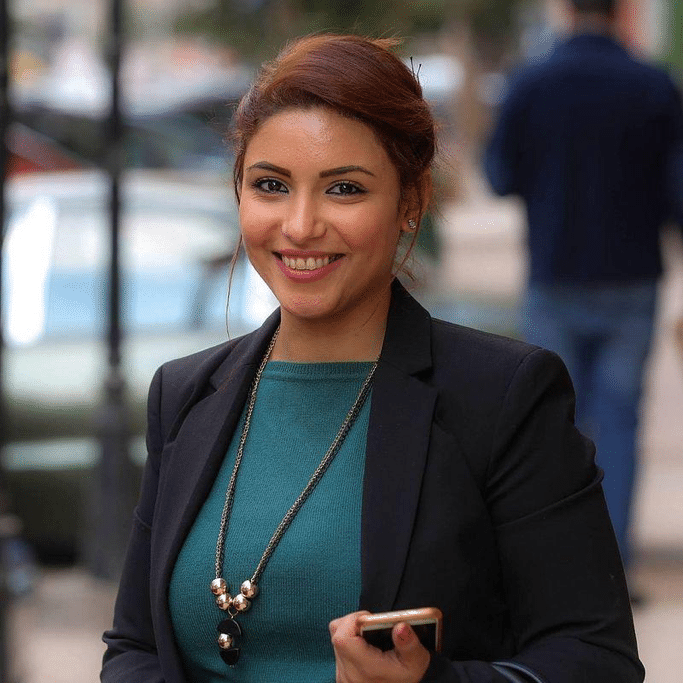
In an interview the online publication The Glocal published on September 29, 2019, Sallam stated:
From the beginning, I chose to be a reporter because of my conviction that the profession of journalism is the only profession to convey the voice of the weak, it is the only one that can change the fate of people, the only one that can make a difference in societies as long as there is an opportunity for it to do so.
Sallam's reports cover various topics such as the 2011-13 political transition in Egypt, sexual harassment, and minority rights. Her short documentaries focus on showing solidarity with underprivileged and discriminated groups. In her documentary "Stories in Sign," published on December 13, 2018 in Mada Masr, she recounted the story of three people living with hearing loss in Cairo—Ahmed, Madonna, and Yasser. The documentary gave her subjects the space to share their lives with disability in Egypt. It also showcased their penchant for hobbies including sports, acting, and dancing. In a different video report with DW, Sallam highlighted a charitable organization in Egypt that founded a football team composed of talented but short-statured players. The report highlighted how these players defied isolation, as well as social and physical constraints, on their way to compete in international championships.
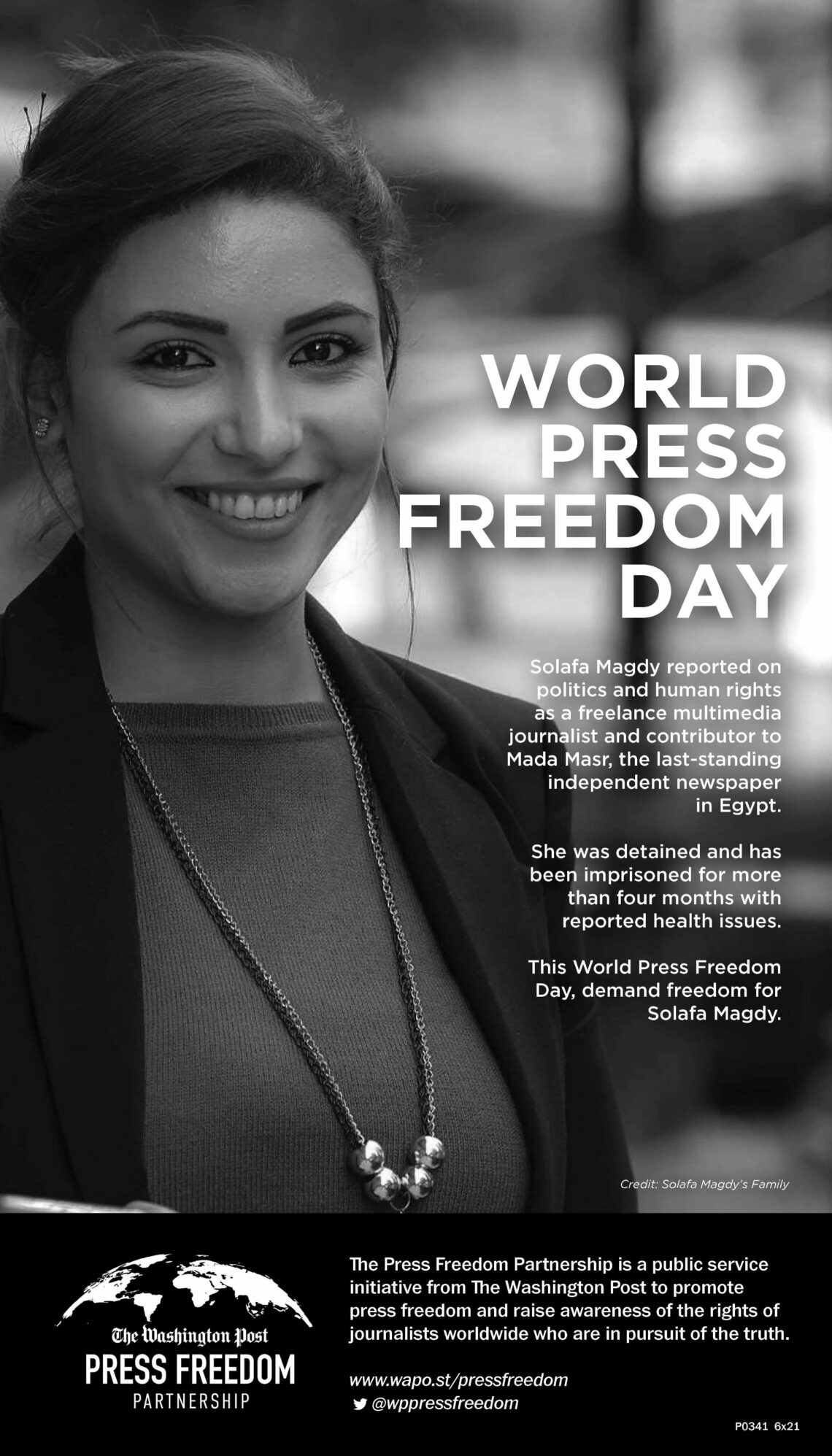
To shed light on the suffering of burn injury survivors and the stigma they face in society, Sallam and el-Sayyad produced a video for the Arabic Network for Human Rights Information (ANHRI) that featured Hind Elbanna, a burn survivor and founder of the Containment Initiative for the Burn Injured.
Time and Circumstances of Arrest
On July 10, 2020, source C told the DAWN researcher that security forces dressed in plainclothes raided a cafe in the Dokki district in Cairo on a Tuesday evening, November 26, 2019 and arrested Solafa Sallam, Hossam el-Sayyad, and their friend Mohammed Salah (also a journalist, and an eyewitness to the arrest of journalist and activist Esraa Abdel Fattah in October 2019). The security forces then ordered the cafe to shut down, according to Al-Manassa news website.
Eyewitnesses later confirmed to Mada Masr that security forces arrested three other unidentified persons in this raid. The ANHRI mentioned that the raiding force punched and kicked Sallam to force her to provide her phone's security code and the keys to her car.
On July 16, 2020, source A told the DAWN researcher that the captors also took Sallam's handbag, which contained around 3000 Egyptian Pounds (around 190 USD). To date, the Dokki police force has not recognized Sallam's confiscated money and belongings in her case file.
Sources D, E and F who spoke to Dawn on July 28, 2020, suggested that the security forces arrested Sallam for her blogging and online campaigning for the release of her imprisoned friend and activist Esraa Abdel Fattah.
According to Khaled Elbalshy, a former member of Egypt's Journalists Syndicate Council, the Dokki police denied Sallam's presence at the station and any knowledge of her whereabouts for more than 17 hours following her arrest. Sallam's lawyer stated in an interview with the Committee to Protect Journalists (CPJ) that the forces handcuffed and blindfolded the three detainees inside a prison room belonging to the National Security (formerly "State Security") Agency inside the Dokki station.
On November 27, 2019, Sallam, el-Sayyad, and Salah appeared before Prosecutor Hussein Amer at the Supreme State Security Prosecution (SSSP) in Cairo's Fifth Settlement.
Charges
DAWN spoke with source B on July 21, 2020. He stated that on November 27, 2019, the Supreme State Security (SSS) Prosecutor Hussein Amer added Sallam, el-Sayyad, and Salah to the defendants in SSSP Case No. 488/2019.
This case encompasses human rights activists and lawyers—including Mahienour el-Masry, Esraa Abdel Fattah, and Amr Imam—politicians and academics—including Dr. Hazem Hosni and Khaled Dawoud, former president of the Dostour (Constitution) Party, journalists—such as Ahmed Shaker—as well as many others.
According to Sallam's lawyer, the prosecutor levelled the following charges against his client:
- Participation in a terrorist organization with knowledge of its purposes
- Spreading false news and statements
Prosecutor Amer charged El-Sayyad with "joining" a terrorist organization. As with other cases investigated by DAWN, such as that of Walid Shawky, the prosecutor neither disclosed the group with which Sallam allegedly collaborated, nor cited the Egyptian penal code articles that correspond to the aforementioned charges.
Trial and Legal Proceedings
- November 27, 2019
In a conversation with DAWN on July 23, 2020, source C said that around noon on November 27, 2019, the families of Solafa Sallam, Hossam el-Sayyad, and Mohammed Salah communicated to the General Prosecutor's office, in reports No. 262205232, 228068020, 228068021, and 238834354, the unlawful arrest and enforced disappearance of the three detainees. They hold the Interior Ministry responsible for their physical safety.
Source C continued that at around 5pm, Sallam, el-Sayyad, and Salah appeared at the SSSP in Cairo' Fifth Settlement. Prosecutor Hussein Amer interrogated Salah first, then Sallam, and finally el-Sayyad. The prosecutor added the three to SSSP Case No. 488/2019 and charged Sallam with "participation with a terrorist organization with knowledge of its purposes" and "spreading false news." Prosecutor Amer put Sallam and the others in pre-trial detention pending investigation. Security forces then took Sallam to al-Qanater Women's Prison and the others to Tora Prison.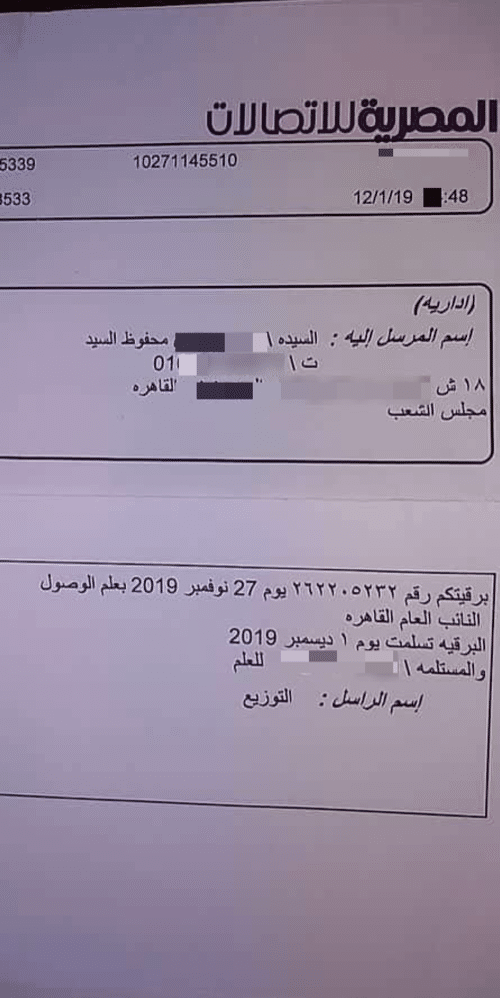
Source B told DAWN on July 21, 2020, that, as with other cases such as Walid Shawky, Khaled Dawoud and Ibrahim Ezz el-Din, the National Security officers, who appear as plaintiffs, presented no evidence to back their charges against Sallam. The officers were the only witnesses in this case.
A member of Sallam's defense team published on his Facebook page on November 27, 2019 at 8:53pm that the defense team requested Prosecutor Amer to include in the interrogation record "the violations that Solafa has been subjected to." These include allegations of verbal abuse, beating, and torture. He specified, "We requested the prosecution to hear her statements as a victim" of these violations as well as the seizure of her car and mobile phone.
- November 28, 2019
Sallam's lawyers submitted a petition to the General Prosecutor's office regarding the abuse that Sallam reportedly suffered inside the Dokki police station and the illegal seizure of her phone and car. The lawyers requested an investigation into these matters and that the prosecution hear Sallam's testimony. The General Prosecutor has not responded to this petition.
- December 8, 2019
The SSSP extended the pre-trial detention of Sallam, el-Sayyad, and Salah—in addition to Esraa Abdel Fattah and Radwa Mohammed—for 15 days pending investigation in Case No. 488/2019. During this time, the prosecution provided no evidence to support the charges against Sallam.
According to Articles 134, 136, 142 and 143 of the Egyptian Code of Criminal Procedure No. 150 of 1950, and amended by Law 145 of 2006 that define and regulate the use of pre-trial detention (for more detailed information on these articles, see Walid Shawky's case), the SSSP's failure to clarify which of the preconditions in these articles Sallam's case met casts serious doubts on the legality of the decision to hold her in remand detention.
- December 9, 2019
Lawyers Khaled Ali and Nabih Elganadi submitted a petition to the General Prosecution in which they contested the legality of the decision "to imprison the couple"—Sallam and el-Sayyad—as a precautionary detention pending the Case No. 488/2019 for "its contradiction with the principle of 'the best interests of the child', and for neglecting the guarantees set by the Egyptian legislator in order to protect the rights of the child in the Egyptian Child Law and the Code of Criminal Procedure in Articles 201 and 488."
While Article 201 of the Egyptian Code of Criminal Procedure gives the prosecutor various alternatives for pre-trial detention, Article 488 stipulates:
If two spouses are sentenced to imprisonment for a period of time not exceeding one year period, even if for different crimes, and they have not been previously imprisoned, the punishment sentenced on one of the spouses may be postponed until the release of the other if they are the guardians of a child not exceeding exactly fifteen years of age and they have a known place of residence in Egypt.
The General Prosecution has not considered this petition.
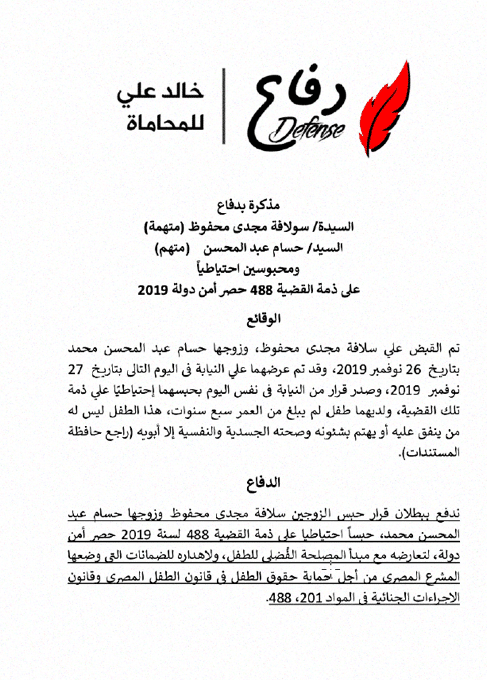
- December 22, 2019
The SSSP extended the pre-trial detention of Sallam, el-Sayyad, Salah, Esraa Abdel Fattah, Khaled Daoud, and Radwa Mohammed for 15 days pending investigation in Case No. 488/2019.
- January 1, 2020
Source C shared with DAWN a New Year's letter Sallam wrote to share publicly:
I say to my son be proud of your mother and your father, they are prisoners because they advocate for a better life for you and for us [all] […] In the new year I say do not forget those who pay their freedom as a price for defending their principles […] do not forget those who dream of a better life for every human.
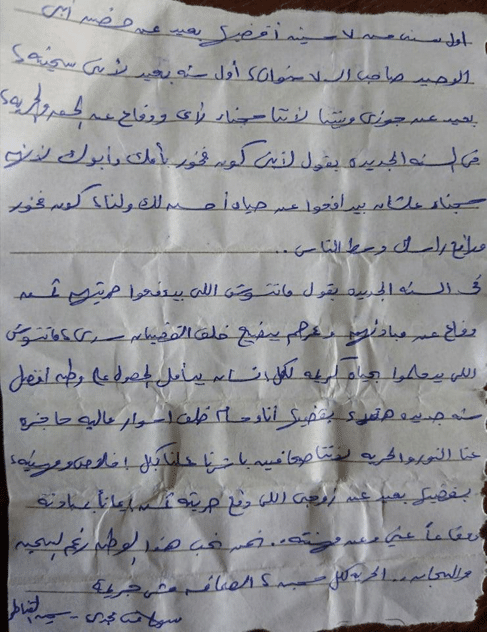
- January 4, 2020
The SSSP extended Sallam's pre-trial detention for 15 days pending investigation in Case No. 488/2019.
According to the 'Free Solafa and Hossam' online campaign, Sallam protested to the prosecutor against the gross medical negligence in the hospital of al-Qanater Women's Prison. Sallam again asked the prosecutor about her car and personal belongings seized by security forces but not acknowledged in official papers. She demanded her right to open an investigation. The prosecutor declined Sallam's request.
- January 21, 2020
The SSSP extended the pre-trial detention of Solafa Sallam and Esraa Abdel Fattah for 15 days pending investigation in Case No. 488/2019.
According to a press statement released by the Egyptian Front for Human Rights on March 12, 2020, Sallam and Abdel Fattah requested the prosecutor document their boycott of al-Qanater Prison's hospital in the case record. They started the boycott because the hospital kept 24 HIV-positive women prisoners in an isolated room without taking any precautionary measures to keep other inmates safe. Sallam and Abdel Fattah expressed their fear of infection through hospital equipment.
- January 31, 2020
Sallam has her 33rd birthday in detention.
On her birthday, Sallam sent a letter—published on February 5, 2020, by 'Freedom for Solafa and Hossam'—from prison. The English translation of the letter by Majdolin Hasan reads:
I'm turning 32 [sic] years old today, and I am a prisoner, far from my only son, far from my husband Hossam, my comrade and companion, separated from him by high walls, prison, guards, and iron. But our love and dreams are still alive.
I hope that we'll return soon to our six-year-old [sic] son because he does not deserve to live far from his parents, and he doesn't even know that we are prisoners!
From my prison cell, I urge journalists and colleagues, males and females, to fight for the sake of the journalism profession, be proud of being journalists, and complete what we can't do while we are prisoners against our will. Journalism is an honor and a pledge, so hold the responsibility and keep the promise.
Ultimately, I hope that the price that we and others had to pay for our freedom is redemption for every person deserves to live free. I did not sin by being a journalist, or by doing my job defending the freedom of the press. I am proud to be a journalist and proud to be a prisoner of conscience; the prison is not a luxury, but it will never break us.
We will still love this country, despite the prison and the jailer.
Solafa – al-Qanater Women's Prison 31-1-2020
- February 2, 2020
The SSSP extended Sallam's pre-trial detention for 15 days pending investigation in Case No. 488/2019.
Sallam's lawyer wrote that the SSSP had originally scheduled the session for February 4. Sallam was happy because she expected to finally see her husband, who also had a session that day. Unfortunately, Sallam could not see him because the SSSP rescheduled her session for two days earlier.
- February 19, 2020
The SSSP extended the pre-trial detention of Solafa Sallam and Esraa Abdel Fattah for 15 days pending investigation in Case No. 488/2019.
- February 27, 2020
According to source B who spoke to DAWN on July 20, 2020, the Cairo Criminal Court rejected the appeal filed by Sallam's lawyer against her and el-Sayyad's imprisonment.
- March 16, 2020
The SSSP extended Sallam's pre-trial detention for 15 days pending investigation in Case No. 488/2019.
March 16, 2020 marked Sallam's last renewal session before the SSSP. According to Article 142 and 143 of the Egyptian Code of Criminal Procedures, the prosecution has the right to renew the detention of defendants pending investigations for up to ten consecutive sessions, with 15 days between each two sessions. In other words, the prosecution can extend the detention of a defendant for a maximum of 150 consecutive days. After the 150-day period, a Criminal Court (Terrorism Circuit or ordinary court) assumes responsibility of the decision to end or extend the detention, with 45 days allowed to pass between Criminal Court sessions. In total, the Code of Criminal Procedure limits the pre-trial detention period to 24 months. After two years of imprisonment, it is mandatory to release the defendant. It should be noted that some SSSP or court sessions may have been held that are not recorded here due to the total absence of public official documents on Sallam's case.
- May 5, 2020
Judge Moataz Khafagy of the Second Terrorism Circuit of Giza Criminal Court extended the pre-trial detention of Sallam, el-Sayyad, and Salah for 45 days pending investigation in Case No. 488/2019. Judge Khafagy made this decision without the defendants present and without hearing the defense pleas, according to Sallam's lawyer. This renewal violates Articles 136 and 143 of the Egyptian Code of Criminal Procedure.
- June 1, 2020
Judge Moataz Khafagy of the Second Terrorism Circuit of Giza Criminal Court postponed the session to decide on the extension of the pre-trial detention of Sallam, el-Sayyad, and Salah pending investigation in Case No. 488/2019, because the defendants could not be brought to the court.
The abdication of al-Qanater Women's Prison of its responsibility to bring the detainee before the court violates Article 77 of Egypt's Prisons Organization Law No. 396 of 1956 which stipulates:
The prison's warden is responsible for implementing any order he receives from the Public Prosecution, from the investigating judge […] or from the court requesting he bring a prisoner; he shall see to it that the prisoner who is requested is sent at the specified date and time.
- June 2, 2020
Judge Moataz Khafagy of the Second Terrorism Circuit of Giza Criminal Court extended the pre-trial detention of Sallam, el-Sayyad, and Salah for 45 days pending investigation in Case No. 488/2019.
The Court made this decision without giving the defendants a chance to be present and without allowing their defense to attend the session. This violates Articles 136 and 143 of the Egyptian Code of Criminal Procedure
- July 5, 2020
Judge Mohamed Sherin Fahmy of the First Terrorism Circuit of Cairo Criminal Court postponed the session to decide on the extension of the pre-trial detention of Sallam, el-Sayyad, and Salah pending investigation in Case No. 488/2019, because the defendants could not be brought to the court.
- July 19, 2020
Judge Mohamed Sherin Fahmy of the First Terrorism Circuit of Cairo Criminal Court extended pre-trial detention of Sallam, el-Sayyad, and Salah for 45 days pending investigations in Case No. 488/2019.
Source B told DAWN on July 29, 2020 that "after more than five months [during which] they had not known anything about each other," Sallam finally reunited with her husband, el-Sayyad, at the court session. It was also the first time since March 2020 that both Sallam and her lawyer attended a court session on the extension of her pre-trial detention.
- August 25, 2020
Judge Rafaat Zaki of the First Terrorism Circuit of Cairo Criminal Court extended the pre-trial detention of Sallam, el-Sayyad, Lawyer Amr Emam, Journalist Ahmed Shaker and four other defendants for 45 days pending investigation in Case No. 488/2019.
- August 30, 2020
In line with the prosecutorial practice of trapping political detainees in endless Revolving Door or Recycling cases, Sallam and el-Masry appeared before the SSS Prosecutors Hazem Amer and Hussein Amer, respectively, who added them to a new case: the SSSP's Case No. 855/2020.
Recycling cases refers to the illegal practice where the prosecution brings a new case against a detainee who has already been released after investigation in a previous case has ended or who is still in pre-trial detention pending investigation in a previous case. According to their lawyer Khaled Ali, Prosecutor Amer accused Sallam with the same charges as in case no. 488/2019:
- Joining a terrorist organization
- Spreading false news
- Misuse of social media
Ali stated that Prosecutor Amer, based on the National Security officers' investigation, accused Sallam and el-Masry of unlawfully communicating with people outside Egypt during their exercise time in prison and during their transfer from the prison to the SSSP or court. Ali argued that these accusations are false and the defendants have not spoken with sources outside the country. He further argued that Sallam and el-Masry have been banned from exercise time and that prison visits have been banned because of COVID-19 since March 2020.
According to Ali, Sallam exercised the right to remain silent in protest of being accused of the same charges that she faced in the prior case against her. When the prosecutor asked her why she remained silent, she replied:
Because there is no difference between the old case and the new case. I spoke in the first case and answered all the questions, and yet I and my husband are still imprisoned and our son is deprived of us. Most likely I will be imprisoned in the new case as well, so there is no difference between speaking and silence. I will leave it to God to sort out.
Sallam "was shocked and her health condition was not good," stated Ali. In this session, Sallam complained to the prosecutor about her back pain and detention conditions. The prosecutor decided to put Sallam and el-Masry in pre-trial detention for 15 days pending investigation in their new case, no. 855/2020. Their imprisonment in the new case will start once their pre-trial detention in case no. 488/2020 is over.
- On April 13, 2021,
The Supreme State Security Prosecution ordered the release of Solafa Magdy Sallam and her husband Hossam Abdel Mohsen Mohammed, commonly known as el-Sayyad. Later that day, Sallam's mother posted a picture of the reunited family on Facebook, stating, "My children are with me." Egyptian security forces arrested Sallam on November 26, 2019 and detained her until this release.
Detention Conditions
After Prosecutor Amer ruled on November 27, 2019 to put Sallam in pre-trial detention for 15 days, pending investigation in SSSP Case No. 488/2019, security forces took her to al-Qanater Women's Prison and the others to Tora Prison.
On June 29, 2020, the DAWN researcher talked with source B who stated:
- The administration of al-Qanater Women's Prison has deliberately isolated Sallam—with fellow inmates, Mahienour el-Masry and Esraa Abdel Fattah—from the outside world since March 2020 by banning her from seeing or sending letters to her family and lawyer. I believe that this is a worrying sign that Sallam and others may have contracted COVID-19 or been subjected to cruel treatment in the prison.
Since March 16, 2020, various watchdog groups have reported suspected COVID-19 cases in the prison. Source B continued:
- Since March 2020, the prison administration has been intransigent in allowing the entry of food, medicine, and clothing brought by the family to Sallam. That prompted Sallam's defense to submit a complaint against the prison administration to al-Qanater al-Khayriyyah prosecution. This legal move in addition to the persistence of Sallam's family has probably played a role in the administration's decision, late in May 2020, to allow these things.
- Mrs. Ragia Omran and Sallam's lawyer visited Sallam in al-Qanater Women's Prison on December 30, 2019. She told them that unidentified State Security and Dokki police officers tortured her, hit her, and stole her phone and car. Sallam said that the reason they hit her was because she refused to hand over her phone and car keys. Ultimately, she gave them up after they threatened that they would hurt her husband badly.
- Sallam, el-Masry, and Abdel Fattah decided to boycott al-Qanater Prison's hospital for fear of infection after the emergence of HIV-positive detainees who have been quarantined in this hospital. This is while the prison administration tries to suppress information about this issue.
Statements from inmates and their relatives confirm the grim conditions inside al-Qanater Women's Prison and its hospital. Jihad Khaled, daughter of 61-year-old inmate Hoda Abdel Moneim, told AFP that this hospital is "rudimentary" and lacks "specialist doctors who can cater to her [mother's] medical needs."
According to the online campaign to release Sallam and el-Sayyad, 'Freedom for Solafa and Hossam,' Sallam started a hunger strike on December 14, 2019 to protest the detention conditions at al-Qanater Women's Prison and her deprivation of "the legal period of the visit stipulated in the Prison Regulation Law, where the duration of her family's visit now does not exceed 15 minutes." The hunger strike reportedly ended some weeks later.
On January 4, 2020, Sallam informed the SSS prosecution during a session to decide on the extension of her pre-trial detention that she would refuse to accept any supplies from the prison's hospital until: the prison's administration investigate the death of Mariam Salem, a prisoner who died in her cell; the prison's administration supply the hospital with proper medications and equipment; and the prosecution interrogate the prison's administration and the hospital's director. Mahienour el-Masry, Sallam's fellow inmate, also communicated these demands to the prosecutor on January 2, 2020.
Impact on family
Source B informed DAWN on June 29, 2020 that Sallam's seven-year-old son Khaled is experiencing psychological trauma due to his parents' disappearances. The ban on letters, phone calls, and family visits since March 2020 further exacerbates his condition.
Sallam and el-Sayyad with their son (Photo credit: Sallam's family)
Source C informed DAWN on July 17, 2020 that Sallam provides domestic and financial care for her mother, Taghreed Zahran. As a result of Sallam and her husband's arrest, Zahran has lost income, and care for their son Khaled has fallen to her.
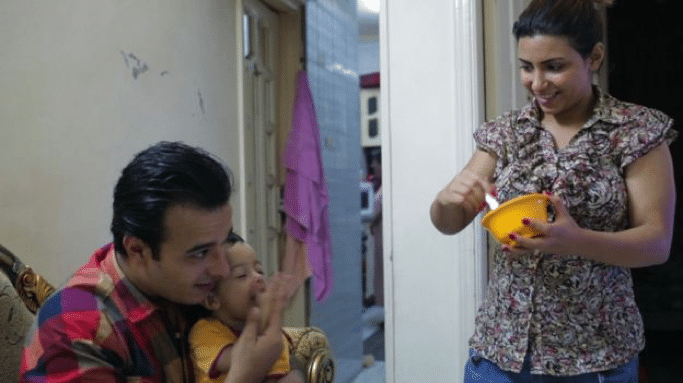
Source A told DAWN on July 16, 2020 that Khaled has not seen his parents since November 2019. She testified:
The administration of al-Qanater Women's Prison permitted us to have regular visits to Solafa and to bring her some medications, but since March 9, 2020, everything turned upside down after a ban on family visits, as a measure against the COVID-19 outbreak. Ever since the Administration banned me three times from delivering food and medications to my daughter and from visiting her, although other prisoners have received these things from their families. For four months now, I have not received even a letter from Solafa.

On November 28, 2019, Sallam's sister, Sondos, published a photo on their mother's Facebook page showing a sign which Khaled—nicknamed "Lulu" by his family—wanted his mother to see. The sign reads: "Lulu, God willing, will be a doctor." Sondos said the family tells Khaled that his parents are abroad, but added that Khaled knows something is wrong because Solafa would always phone or video-call him on her previous travels "a hundred times" a day.
On November 30, 2019, Sondos, published on her Facebook page that "Lulu [Khaled] got very sick because of an allergy yesterday night. […] This is the first time for Khaled to be sick while his mother is not by his side, to go to a physician or hospital alone without his mother or his father."
On January 9, 2020, Khaled received a letter from his mother:
On June 10, 2020, Sallam's family published a video of Khaled expressing how much he misses his parents and that he is waiting for letters from them.
On August 4, 2020, Khaled turned seven-years-old, celebrating without his parents.
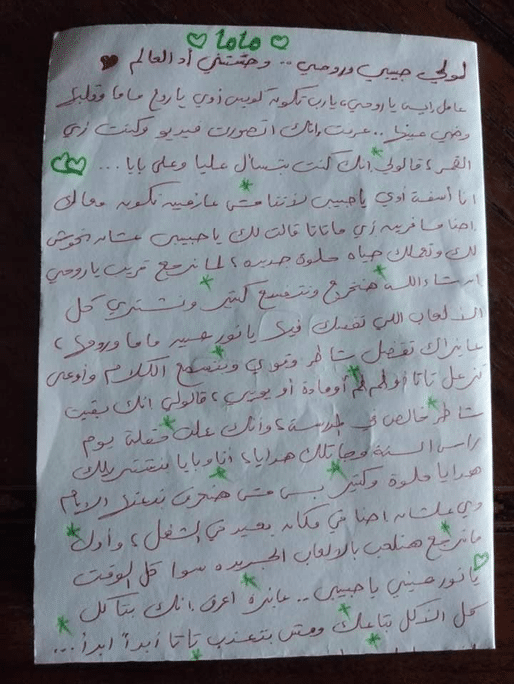
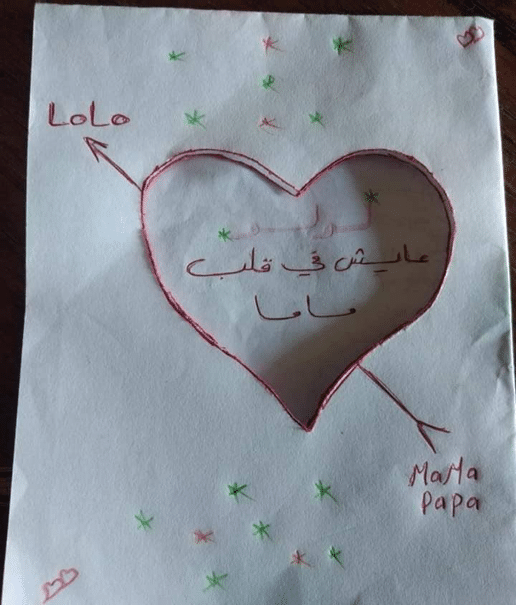
After the Ministry of Interior decided to resume family visits to prisoners on August 15, 2020, Zahran wrote on her Facebook page: "It's the first time for me to be scared and afraid of meeting my daughter, it's the first time that I am worried about her [that she will be shocked] because of my look that changed due to the oppression and sadness."
Violation of Rights
- The right to freedom and security
Security forces forcibly detained Sallam and her husband on November 26, 2019 in Dokki district, Cairo, without presenting any legal warrants. They reportedly punched and verbally abused Sallam and stole her car and phone.
[Article 14, Arab Charter on Human Rights; Article 9 (1), International Covenant on Civil and Political Rights (ICCPR); Article 3, 9, Universal Declaration of Human Rights (UDHR)]
- The right not to be subjected to enforced disappearance
According to the statements from Sallam's lawyer, Khaled Ali, the testimonies from journalists (such as Khaled el-Balshy) and activists (such as Yara Sallam), and the family's telegrams and petitions to the General Prosecutor, the Dokki police officers forcibly disappeared Sallam for more than 15 hours. They denied any knowledge of her whereabouts, risking her safety and leaving her outside the protection of the law.
[International Convention for the Protection of All Persons from Enforced Disappearance (Convention CED); Principle 1, 6, Principles on the Effective Prevention and Investigation of Extra-legal, Arbitrary and Summary Executions]
- The right to humane treatment and the prohibition of torture
According to different sources, security forces from Dokki police station beat Sallam to coerce her to relinquish her car and personal phone. In prison, the administration of the al-Qanater Women's Prison deprived Sallam of food and medications sent by her family. The prison and its hospital denied Sallam and others proper medical care and risked their lives with negligence and inhumane detention conditions.
[Article 15, 16, 30, Egypt's Prisons Organization Law No. 396 of 1956; Article 55, Egypt's Constitution; Article 5, African Charter on Human and Peoples' Rights; Article 5, UDHR; Article 7, ICCPR; Article 2, 10 (1, 2), Convention against Torture and Other Cruel, Inhuman or Degrading Treatment or Punishment (CAT)]
- The right to fair trial
Since November 26, 2019, Sallam remains in unlawful pre-trial detention. The Terrorism Circuits' flagrant disregard of the Egyptian Code of Criminal Procedure (Articles 136, 142 and 143) by renewing Sallam's pre-trial detention on multiple occasions without her or her lawyer's presence is one of the most prominent violations of the provisions protecting the right to a free trial. According to the Egyptian Commission for Rights and Freedoms' lawyer, the illegality of these decisions is "absolute."
[Article 77, Egypt's Prisons Organization Law No. 396 of 1956; Article 96, Egypt's Constitution; Article 13, 14, 16 Arab Charter on Human Rights; Article 7, African Charter on Human and Peoples' Rights; Article 14, ICCPR]
o The right to defense and legal representation
[Article 54, Egypt's Constitution; Article 16 (3, 4) Arab Charter on Human Rights (ACHR); Article 14 (3 b, d), ICCPR; Section A, article 2 (f), Principles and Guidelines on the Right to a Fair Trial and Legal Assistance in Africa; Principle 17 (1, 2), 18, Body of Principles for the Protection of All Persons under Any Form of Detention or Imprisonment; Rule 93, Standard Minimum Rules for the Treatment of Prisoners; Principle 7, 8, Basic Principles on the Role of Lawyers]
o The right to reasonably-timed trial or release
[Article 54, Egypt's Constitution; Article 14 (5, 6) Arab Charter on Human Rights; Article 9 (3) ICCPR; Principle 37, 38, Body of Principles for the Protection of All Persons under Any Form of Detention or Imprisonment]
- The right to physical and mental health
On January 4, 2020, Sallam protested to the SSS Prosecutor against the gross medical negligence in the hospital of al-Qanater Women's Prison. Sallam and her fellow inmates Esraa Abdel Fattah and Mahienour el-Masry demanded the SSS prosecution investigate the death of Mariam Salem in her cell and that they interrogate Brigadier Walid Salah, the prison's warden, and Dr. Mohammed Ehab Elgohari, the prison hospital's director. Sallam and her fellow inmates also boycotted the hospital entirely after the discovery of tens of HIV-positive cases the administration had quarantined in a room inside the hospital without informing the prisoners or taking precautionary measures to protect others.
[Article 18, 55, Egypt's Constitution; Article 14 (4) Arab Charter on Human Rights; Article 25 (1), UDHR; Article 12 (1), ICESCR; Principle 9, Basic Principles for the Treatment of Prisoners; Principle 24, Body of Principles for the Protection of All Persons under Any Form of Detention or Imprisonment]
- The right to communicate with the outside world, particularly with family
Source A told DAWN on July 20, 2020 that al-Qanater Women's Prison banned Sallam from receiving visits, making phone calls, and sending letters between March and June 2020. Since security forces arbitrarily detained her on November 26, 2019, Sallam has not been able to see her seven-year-old son, Khaled, and she saw her detained husband for the first time on July 19, 2020.
[Article 38, Egypt's Prisons Organization Law No. 396 of 1956; Article 54, Egypt's Constitution; Article 21, Arab Charter on Human Rights; Article 12, UDHR; Article 17 (1, 2), ICCPR; Principle 19, Body of Principles for the Protection of All Persons under Any Form of Detention or Imprisonment; Rule 37, 39, 79, 92 Standard Minimum Rules for the Treatment of Prisoners]
- The best interests of the child
According to the December 9, 2019 petition submitted by lawyers Khaled Ali and Nabih Elganadi, the decisions of the SSSP and Terrorism Circuits to put Sallam and el-Sayyad into pre-trial detention, forcing them to abandon their seven-year-old son, violated the Egyptian Child Law and Article 3 (1) of the UN Convention on the Rights of the Child. Article 3 stipulates:
In all actions concerning children, whether undertaken by public or private social welfare institutions, courts of law, administrative authorities or legislative bodies, the best interests of the child shall be a primary consideration.
The courts' decisions also violated Article 488 of Egypt's Code of Criminal Procedure, which prioritizes the wellbeing of the child over the simultaneous imprisonment of both parents.
[Article 3 (a, b); Article 96 (1, 3), Egyptian Child Law; Article 3 (1), the UN Convention on the Rights of the Child; Article 488, the Egyptian Code of Criminal Procedure]
Officials Involved in Prosecution and Detention
Hamada al-Sawy, General Prosecutor of Egypt
According to Sallam's lawyers, Prosecutor al-Sawy neglected to investigate any of the petitions and pleas submitted to his office by them and Sallam's family regarding her unlawful detention, torture, and the security forces' theft of her mobile phone and car.
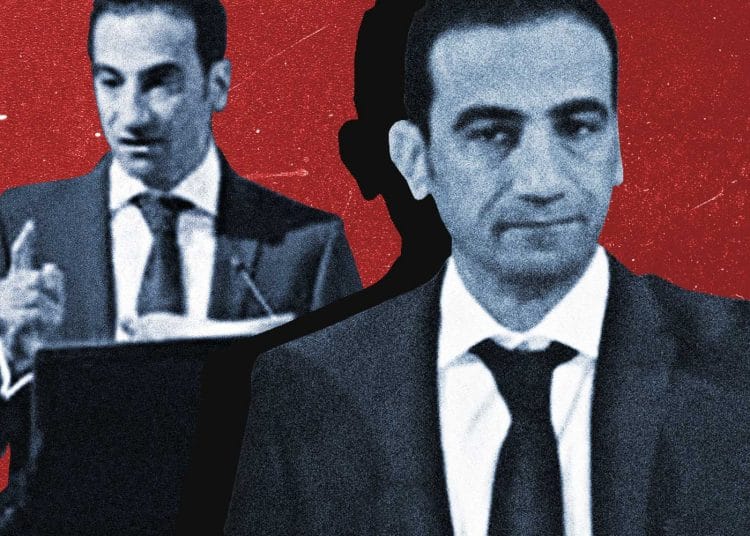
Khaled Diaa el-Din, First Attorney General of the SSSP
All prosecutorial decisions permitting and extending the unlawful pre-trial detention of Sallam are issued in the name of Prosecutor Diaa el-Din. Lawyers who specialize in SSSP cases told DAWN that the SSSP issues all of its decisions in the name of Diaa el-Din, the First Attorney General of the SSSP not the interrogators or prosecutors who actually question the defendants.
SSS Prosecutor Hussein Amer
Prosecutor Amer interrogated Sallam on November 27, 2019 and ordered her remand detention despite the reported failure of the National Security officers to present any evidence against Sallam or witnesses to back their allegations.
Prosecutor Amer's order was made even though no evidence was presented to establish any of the statutory conditions for pre-trial detention as stipulated in Article 134 of Egypt's Code of Criminal Procedure.
He reportedly did not investigate the Dokki police's physical assault against Sallam and their theft of her phone and car.
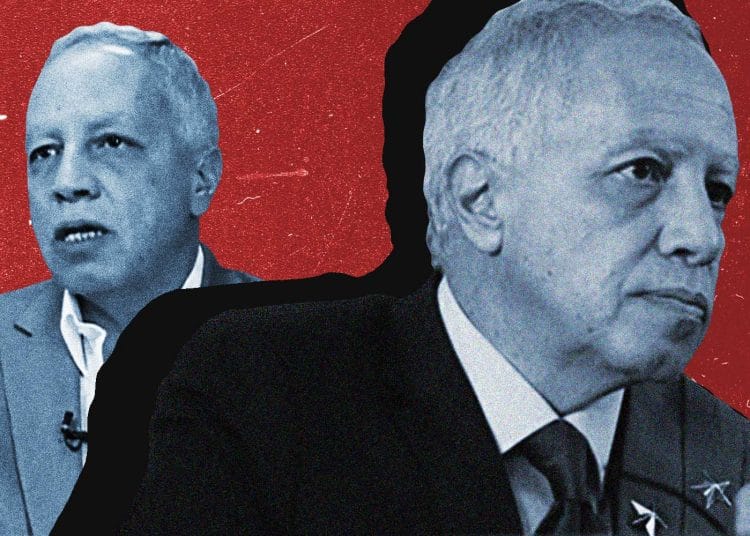
Moataz Khafagy, Head of the Second Terrorism Circuit of the Giza Criminal Court
Khafagy extended Sallam's unlawful pre-trial detention on May 5 and June 2, 2020 even though no evidence was presented to establish any of the statutory conditions for pre-trial detention as stipulated in Article 134 of Egypt's Code of Criminal Procedure. The absence of the reasons for his decisions to extend her remand detention violated Article 136 of Egypt's Code of Criminal Procedure which stipulates that:
Before issuing a detention order, the investigating judge must hear the statements of the Public Prosecution and the defense of the accused. The detention order must include an explanation of the crime attributed to the accused, the penalty prescribed for it, and the reasons upon which the order is based. The provision of this article shall apply to orders issued to extend pre-trial detention, in accordance with the provisions of this law.
Khafagy's decisions to extend Sallam's pre-trial detention without bringing her to the court or hearing her lawyer's defense pleas violated Articles 136 and 143 of Egypt's Code of Criminal Procedure, stipulating that "before issuing a detention order," the investigating judge must hear "the statements […] of the defense of the accused," and that "extending remand detention" must be preceded by hearing "the statements of […] the defendant."
Given the circumstances of their case, Khafagy's decisions to extend the pre-trial detention of Sallam and her husband el-Sayyad reportedly ignored the legal protection provided for their son, Khaled, under the principle of 'the best interests of the child' guaranteed by the Egyptian Child Law and Articles 201 and 488 of Egypt's Code of Criminal Procedure.

Mohamed Sherin Fahmy, Head of the First Terrorism Circuit of the Cairo Criminal Court
Fahmy extended Sallam's unlawful pre-trial detention on July 19, 2020 even though no evidence was presented to establish any of the statutory conditions for pre-trial detention as stipulated in Article 134 of Egypt's Code of Criminal Procedure. The absence of the reasons for his decision to extend her remand detention violated Article 136 of Egypt's Code of Criminal Procedure which stipulates that:
Before issuing a detention order, the investigating judge must hear the statements of the Public Prosecution and the defense of the accused. The detention order must include an explanation of the crime attributed to the accused, the penalty prescribed for it, and the reasons upon which the order is based. The provision of this article shall apply to orders issued to extend pre-trial detention, in accordance with the provisions of this law.
Given the circumstances of their case, Fahmy's decision to extend the pre-trial detention of Sallam and el-Sayyad reportedly ignored the legal protection provided for their son, Khaled, under the principle of 'the best interests of the child' guaranteed by the Egyptian Child Law and Articles 201 and 488 of Egypt's Code of Criminal Procedure.
Rafaat Zaki, Member of the First Terrorism Circuit of the Cairo Criminal Court
Zaki extended Sallam's unlawful pre-trial detention on August 25, 2020 even though no evidence was presented to establish any of the statutory conditions for pre-trial detention as stipulated in Article 134 of Egypt's Code of Criminal Procedure. The absence of the reasons for his decision to extend her remand detention violated Article 136 of Egypt's Code of Criminal Procedure which stipulates that:
Before issuing a detention order, the investigating judge must hear the statements of the Public Prosecution and the defense of the accused. The detention order must include an explanation of the crime attributed to the accused, the penalty prescribed for it, and the reasons upon which the order is based. The provision of this article shall apply to orders issued to extend pre-trial detention, in accordance with the provisions of this law.
Given the circumstances of their case, Zaki's decision to extend the pre-trial detention of Sallam and el-Sayyad reportedly ignored the legal protection provided for their son, Khaled, under the principle of 'the best interests of the child' guaranteed by the Egyptian Child Law and Articles 201 and 488 of Egypt's Code of Criminal Procedure.
International reactions
- On November 29, 2019, journalists and researchers at the French newspaper Liberation, called for the immediate release of Solafa Sallam, Hossam el-Sayyad, Mohammed Salah, and Esraa Abdel Fattah.
- On January 22, 2020, the special rapporteurs of the Human Rights Council sent Communication (ref. UA EGY 1/2020) to the Egyptian government, requesting it investigate alleged violations of the human rights of Solafa Sallam, Hossam el-Sayyad, and Mohamed Salah.



